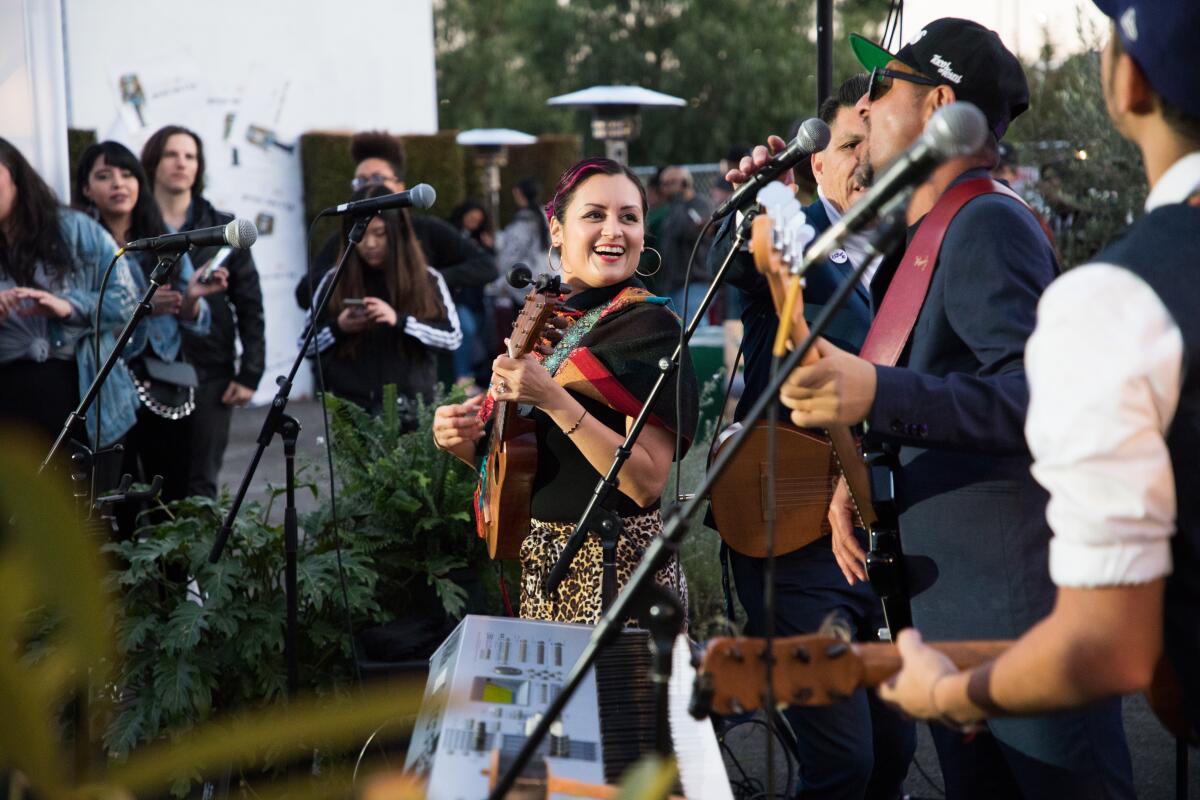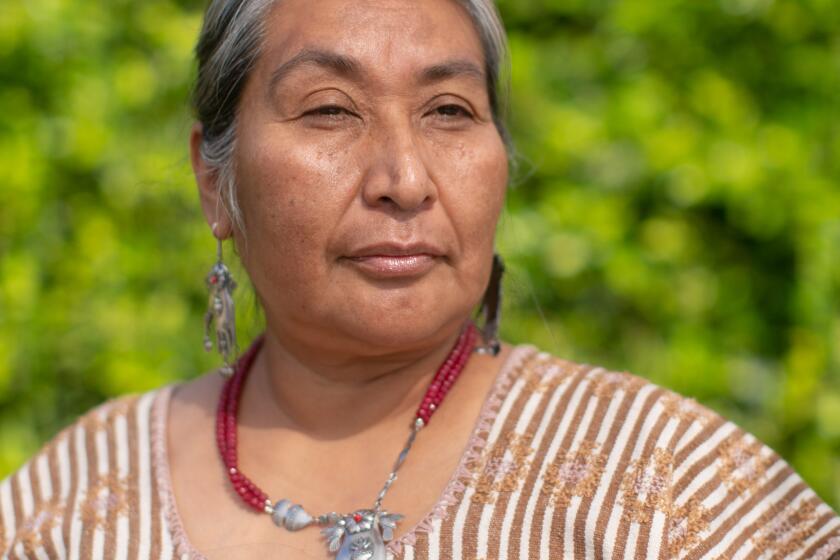After leaked racist audio, this L.A. band’s love song to Oaxaca lights up TikTok

- Share via
She called them “dark little people,” adding “tan feos” (“they’re ugly”) and claimed she didn’t know where they came from.
Former L.A. City Council President Nury Martinez’s recently leaked racist remarks about Oaxacans living in Los Angeles sparked a major backlash this week that led to her resignation Wednesday.
Martinez’s comments employed stereotypes that have long been used against Oaxacans in Mexico and in the United States.
The L.A. Chicano band Las Cafeteras, which formed in 2005 and fuses folk music with spoken word, was horrified by Martinez’s comments and wanted to remind fans of Oaxaca’s beauty with its 2021 song “Oaxaca Love Song No2.”
So on Wednesday, the band shared the song in a TikTok video, which has more than 90,000 views. “While Latino politicians hate on Indigenous Oaxacans ... we wrote a love song to them,” the accompanying text reads.
“En Oaxaca todo brilla y se come con tortilla,” singer Hector Flores proudly belts out at the end of the video, which is a snippet of the track’s music video. “Everything shines in Oaxaca and you eat using a tortilla.”
Audio of Councilmembers Nury Martinez, Kevin de León and Gil Cedillo speaking with labor leader Ron Herrera quickly became a new and incendiary issue in the Nov. 8 election.
Most of the comments below the video expressed love and support for Oaxaca and its people.
“As a Oaxaqueña, I love this,” @yeya.25 wrote in the TikTok comments.
@millennialtrapped wrote, “love to Oaxaca from a Zacatecan,” referring to people from the Mexican state of Zacatecas.
“We used to go to Juquila, Oaxaca every summer and loved driving through the hills, all natural beauty,” reminisced @heathercar_16.
“Que viva Oaxaca!” @serengarr simply, yet proudly proclaimed.

“I feel like the [leaked] recordings have created, for better or for worse, a new day in Los Angeles,” Flores, of Las Cafeteras, told The Times. “And it’s now our responsibility, I think, as people of color, specifically Mexicans, Chicanos and Latinos to really take this as an opportunity to do better — to be better.”
In the song, Flores — an East L.A. native of Mexican descent who describes himself as an organizer, activist and artist — incorporated elements of ‘60s psychedelic, big band, folk music and son jarocho (regional folk music from the Mexican state of Veracruz).
The track goes on to describe Flores’ experience of eating “tacos de quesito” (cheese tacos) and “tlayudas” (a regional dish of Oaxaca) and the beautiful things of Oaxaca, from its people to its land.
Flores’ description of Oaxacan beauty stands in direct contrast to Martinez’s insidious comments, which the musician noted are not uncommon in the Latino community.
‘I thought we had made great progress in the last three years in gaining recognition,’ said one Oaxacan, who criticized remarks by Nury Martinez.
“You can’t talk about Nury without talking about the elephant in the room — she’s not the only one,” he said, adding that Martinez and fellow L.A. City Councilmembers Kevin de León and Gil Cedillo are “examples of what will continue to happen if we do not do the work we need to do internally and externally.

The 40-year-old musician acknowledged that even though there are many great parts of Mexican culture, there are “toxic” aspects as well. White supremacy, he said, has as much of a stronghold on Mexico as it does the United States.
“Racism, colorism, homophobia, patriarchy are long-standing values of Mexicans and therefore, also become long-standing values for Mexican Americans. ... In Mexico, there’s racism against Indigenous folks, the caste system of colonialism is still so intact.”
Los Angeles is home to one of the largest Oaxacan communities outside of Mexico. Raúl Hinojosa-Ojeda, a professor at UCLA’s Department of Chicana and Chicano Studies, estimated that there are as many as 200,000 Zapotecs — the largest Indigenous group from Oaxaca — living in Los Angeles County. As early as the 1940s, Oaxacan immigrants came to the United States in search of better wages and jobs, working in agriculture through the bracero program. Oaxaca, located in southern Mexico, is one of the country’s poorest states, but the people have deeply influenced U.S. culture and food and helped to shape Los Angeles.
Oaxacans in Mexico have long faced prejudice and struggle to be represented. After Yalitza Aparicio became the first Indigenous woman of Mexico to be nominated for an Oscar for lead actress in the 2018 movie “Roma,” she faced a wave of vitriol from other Mexican celebrities, calling the actor “fea” (“ugly”) and an “india” (“Indian,” derogatorily)..
The members of Las Cafeteras aren’t the only Angelenos defending Oaxacans. There will be a march for Oaxacan justice this Saturday in Los Angeles. The procession, which begins at noon at the Los Angeles Trade Technical College, will be a celebration of Oaxacan culture and an opportunity for Angelenos to stand in solidarity with the city’s sizable Oaxacan community.
The councilmembers allowed then-City Council President Nury Martinez to rattle on with her racist diatribe without telling her it was unacceptable, securing their political fall, columnist George Skelton writes.
“I’d be lying if I said I didn’t have family members who haven’t said such things like this,” Flores said of Martinez’s incendiary comments. “And I feel like for Latinos, we think that [confronting racism] just has to apply to all white folks ... No, we need to understand [our racism] as much as anybody else — the Mexican community, as much as anybody else.”
In a Wednesday Instagram post, Las Cafeteras expanded on the message presented in “Oaxaca Love Song No2.”
“Last year we wrote a Love Song ❤️ to Oaxaca called ‘Oaxaca Love Song #2’ — for our love of the culture, food and Indigenous resiliency of Oaxacan peoples…the culture is so strong in Cali that folks coined the term OaxaCalifornia ❤️ Check out the music video which begins with @ponchostlayudas speaking in Zapotec — one of the Indigenous languages of Oaxaca!...Que Viva #Oaxaca #ResignNow #OaxaCalifornia #tlayudas #porvida”
Flores, who was inspired to write the song while taking a trip to Oaxaca in 2018, told The Times he added the “No2” in the track’s title because he knows he’ll never be the one to write the best love letter to the Mexican state.
“The reason I call it number two is because I’m not Oaxacan, and there’s no way a non-Oaxacan will ever write the best Oaxacan love song. So the best I can ever hope is to be number two,” he said
“You ain’t gotta be from a place to uplift, a place, a people, a culture,” Flores said.
Celebrate L.A.’s Oaxacan restaurants in support of a community targeted by racist comments in leaked audio of city political leaders — best tlayudas, memelas, tetelas, cecina, tasajo and more.
When constructing the track’s music video, Flores and the band wanted to craft something that felt truly Oaxacan.
“So we started [the video] off with Poncho from Poncho’s Tlayudas, who sells the best tlayudas in L.A. out of his backyard in South L.A. every Friday night. And we wanted him to introduce the video in Zapotec,” he said. “That was a way for us to give a nod to the native languages that are still be spoken in L.A. A nod to people doing Oaxacan organizing and chefs in L.A., you know, by non-Oaxacans, such as myself.”
‘You are not # goals or inspo,’ Melinna Bobadilla said after Nury Martinez addressed ‘all little Latina girls’ in her L.A. council resignation letter.
“Silence is as much a killer than anything, right, like silence will do as much to erase a culture as words can,” Flores said. “And so I feel like when we don’t hear it, then we almost think it don’t exist.”
“Oaxacan Love Song No2” isn’t the band’s only foray into activist messaging. Their 2012 song “It’s Movement Time” documents what Flores calls “Black and brown solidarity” in both Mexico and the United States. The group’s 2017 track “If I Was President” imagines the United States run with less corruption and more empathy and solidarity.
“For this video to get some love now in a time where Oaxacan folks are being bashed, hated on, it’s like, ‘No, uh-uh, let’s show the love,’” Flores said of the song’s spike in popularity. “Because I think right now a lot of people are highlighting the divisions. But it takes one bad thing to overshadow 10 good things. You know, and that’s just the reality of our world.”
More to Read
The biggest entertainment stories
Get our big stories about Hollywood, film, television, music, arts, culture and more right in your inbox as soon as they publish.
You may occasionally receive promotional content from the Los Angeles Times.














